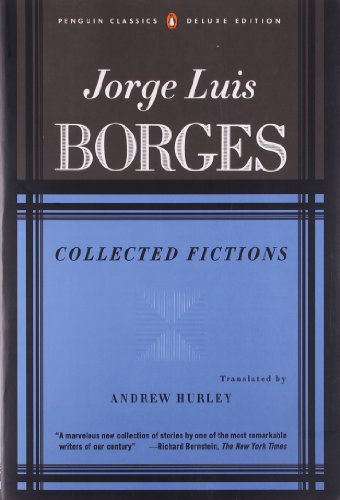Although Jorge Luis Borges published his first book in 1923–doling out his own money for a limited edition of Fervor de Buenos Aires–he remained in Argentinian obscurity for almost three decades. In 1951, however, Ficciones appeared in French, followed soon after by an English translation. This collection, which included the cream of the author’s short fictions, made it clear that Borges was a world-class (if highly unclassifiable) artist–a brilliant, lyrical miniaturist, who could pose the great questions of existence on the head of pin. And by 1961, when he shared the French Prix Formentor with Samuel Beckett, he seemed suddenly to tower over a half-dozen literary cultures, the very exemplar of modernism with a human face.
By the time of his death in 1986, Borges had been granted old master status by almost everybody (except, alas, the gentlemen of the Swedish Academy). Yet his work remained dispersed among a half-dozen different collections, some of them increasingly hard to find. Andrew Hurley has done readers a great service, then, by collecting all the stories in a single, meticulously translated volume. It’s a pleasure to be reminded that Borges’s style–poetic, dreamlike, and compounded of innumerable small surprises–was already in place by 1935, when he published A Universal History of Iniquity: “The earth we inhabit is an error, an incompetent parody. Mirrors and paternity are abominable because they multiply and affirm it.” (Incidentally, the thrifty author later recycled the second of these aphorisms in his classic bit of bookish metaphysics, “Tlon, Uqbar, Orbis Teris.”) The glories of his middle period, of course, have hardly aged a day. “The Garden of the Forking Paths” remains the best deconstruction of the detective story ever written, even in the post-Auster era, and “Pierre Menard, Author of the Quixote” puts the so-called death of the author in pointed, hilarious perspective.
But Hurley’s omnibus also brings home exactly how consistent Borges remained in his concerns. As late as 1975, in “Avelino Arredondo,” he was still asking (and occasionally even answering) the same riddles about time and its human repository, memory: “For the man in prison, or the blind man, time flows downstream as though down a slight decline. As he reached the midpoint of his reclusion, Arredondo more than once achieved that virtually timeless time. In the first patio there was a wellhead, and at the bottom, a cistern where a toad lived; it never occurred to Arredondo that it was the toad’s time, bordering on eternity, that he sought.” Throughout, Hurley’s translation is crisp and assured (although this reader will always have a soft spot for “Funes, the Memorious” rather than “Funes, His Memory.”) And thanks to his efforts, Borgesians will find no better–and no more pleasurable–rebuttal of the author’s description of himself as “a shy sort of man who could not bring himself to write short stories.” –James Marcus






I now describe my pet turtle as monstrous I have always been hesitant to read fiction originally written in any language except English. I’m fickle enough as it is without needing another person’s biases and tendencies interfering with my own… and so it was with great trepidation that I bought Hurley’s collection.The stories in summation: marvelous. Hurley’s work? I’ll never be able to read these Borges stories again without Hurley’s translation heavily influencing, and that is an endorsement. I suspect that for most…
A trove of mythological stories defying space and time. Some earlier reviewers complained about the quality of the translation of this collection of stories by Andrew Hurley, especially when compared to the collaboration between Jorge Luis Borges, (JLB, as he liked to sign), and Norman Thomas di Giovanni in preparing Labyrinths. (I suggest you read all reviews in the order they were written.) As one reasonably familiar with JLB’s oeuvre, (a word JLB disliked), I state unequivocally that paying six dollars more for four times the number of…
Comments are disabled for this post.